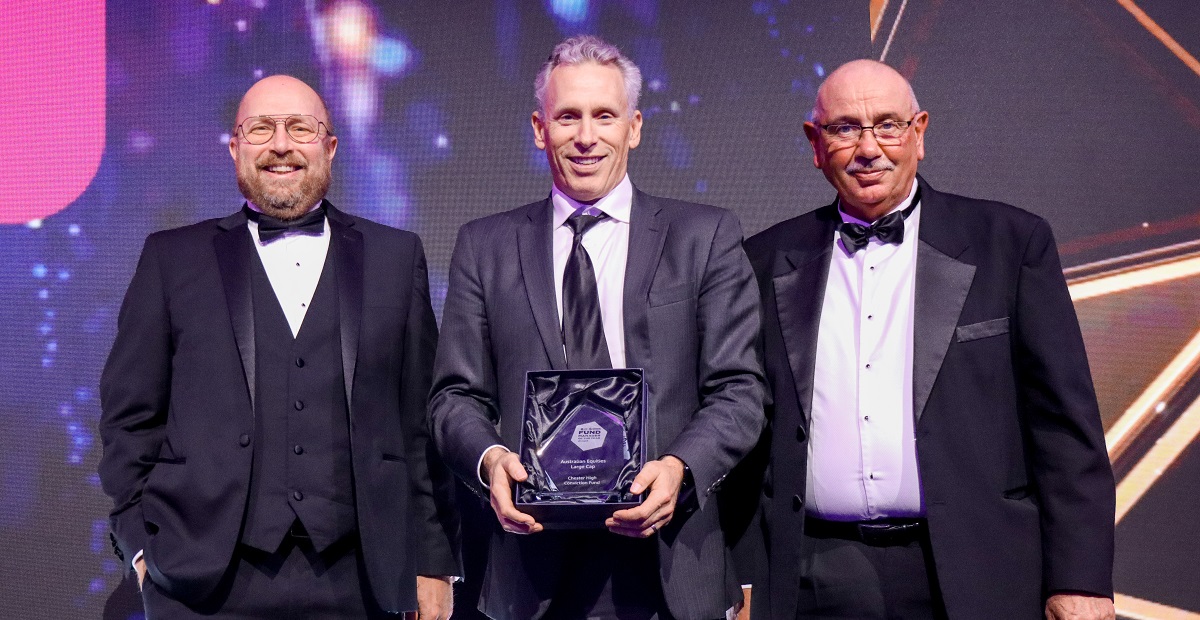Embracing the ‘unloved and underappreciated’ – Chester AM’s secret ‘source’

Big caps are big for good reason – they are safe, long-lived, and offer reliable, if largely modest, returns for their many investors. The volatile small caps, on the other hand, offer growth potential to hyper-charge portfolio returns but attract substantial risk. So, what of everything in between? For the Melbourne-based boutique Chester Asset Management, there is gold to be found in these “unloved, undiscovered and underappreciated” Aussie equities.
In what many now regard as the most challenging investment environment since the 2008 global financial crisis, Chester’s High Conviction fund, winner of Financial Newswire’s 2023 Fund Manager of the Year award in the Australian Equity Large Cap category, has delivered an impressive, index-bucking performance.
The ‘long-only’ fund, centred on the ASX 300 Index, has returned on average 15.4% to investors over the last three years – more than five percentage points above its peer group.
With the fund notable for its “mid-cap bias”, portfolio lead and Chester AM founder Rob Tucker finds much to love in these neglected middlings.
“We’re trying to identify stocks that can be in excess of GDP growers. That’s how you get excess returns,” he said.
“We don’t own BHP and we don’t own CommBank, so we heavily underweight the top 20 [in our fund].
“We allocate capital in a very benchmark-unaware manner. It doesn’t matter that CommBank is 9% of the index, if we don’t think that’s going to generate an appropriate turnover over the next three years, we won’t own CommBank.
According to Tucker, a significant portion of the fund’s alpha is generated from “unloved, undiscovered or underappreciated” assets.
“[We’re] trying to find smaller or mid-cap names that have the ability to grow into either market share gains or the tailwinds of an industry exposure.”
A perfect case in point is Chester’s backing of local shipbuilder Austal. “Unloved” by the wider market, largely due to a recent contract write-down, Austal, Tucker believes, will more than offset this loss over the next decade.
“To me, [this small loss] doesn’t take away from the fact they’ve got this huge order book that the market is completely ignoring.”
Securing big contracts with the US Navy and US Coast Guard, Austal expects to generate between $25 or $30 million a year in sustained earnings over the next decade.
There is significant unrealised potential in a stock, he notes, that is currently trading at just “0.7 times book value”.
Revealing his core strategy, Tucker said: “I really try to find an asymmetric outcome.
“When you initially allocate capital, you’re trying to minimise the downside, see catalysts and identify why the upside could occur.”
He added: “For me, I far prefer looking at stocks that might have fallen 30, 40, or 50 per cent than those that have risen 30, 40, or 50 per cent from those QAAP [quality at any price] stocks.”
Maximising the downturn
While nearly all equities funds will ultimately gain from a rising economic tide, the strength of the High Conviction fund, Tucker said, is its buoyancy in the downturn.
“I hate losing money in down markets,” Tucker declared.
“Historically, [our] fund tends to perform much better in down markets. When the market goes backwards, we’ve outperformed 80% of the time on a monthly basis.
“We absolutely endeavour to outperform down markets and then grow with the up markets.”
He concedes, however, that mid-caps are “not always the safest port in a storm” during a GFC-style event.
To offset these risks, the fund is effectively hedged with gold and cash assets, which together constitute around 15% of the fund.
“In our alpha generation, the fund has been pretty successful over almost 10 years; this has actually been delivered with lower volatility because of that gold and the cash piece.”
For Tucker, consistency in returns is grounded in Chester’s core philosophy: ‘To protect and grow generational wealth’.
“Equity markets are a journey – it’s not a two, or three, or four-year thing. I want superannuation clients that will be with us for 20 or 30 years. That’s the best way, I think, to allocate capital, to consider it over that timeframe.”
So how has the fund stood out from its peers?
First and foremost, the fund is highly active, with an active share above 80%, Tucker said. Every one of the Chester management team’s 11 years of shared expertise is leveraged to drive its impressive performance on SQM’s quantitative metrics.
“Stronger alpha with lower volatility tends to lead to lower drawdowns and higher Sharpe ratios. These quantitative factors were certainly the reason the Chester High Conviction Fund was recognised.”
“We must say we were thrilled to be nominated against the Australian large cap peer group of finalists, a group of investors which we hold in the highest regard.”
Economic pain before gain
Despite the weaknesses exposed in the post-Covid economy (with fast-rising inflation and policy rates, a spiralling China economy, and slow-to-recover supply chains) Tucker said the wider economy has held up remarkably well in this time, driven by strong growth in the US.
He frets, however, that the US Government’s pump priming play could unravel over the next year.
And, while Aussie equities remain Chester’s bread and butter, the aphorism still stands: When America sneezes, the world gets a cold.
“Federal deficit spending has been far stronger than we’d have thought. At 8-9% of GDP, it’s close to… where it was during the pandemic response, which is really aggressive,” he said.
“This is simply unsustainable.”
Moreover, a post-Covid spending spurt has seen a rapid erosion of household savings.
“The US household savings rate has depleted from $2.1 trillion in 2021 to $180 billion now,” Tucker said.
He believes “we’ve reached a juncture” in the global economy with systemic weaknesses likely to be exposed. However, there is an upside for equities and mortgage holders.
“Economically, it probably looks like the next 12 months looks choppier than the last 12 months,” Tucker said.
“But with that probably comes the relief that interest rates are peaking, and probably perhaps falling in the next 12 months.”
“This might give a relief to equities and the way we think about valuations. But there is some cyclical weakness to occur first.”











Former adviser to Bill Shorten, when he was the Minister for Financial Services, He'll put us to the sword!
here we go, new member, new advice, new wooden steering we have to carve in order for him to "Steer…
Haven't they had a couple of years to prepare already?
Yep in fact watch a stack of previously “signalled” changes take centre stage again j fear for the diagonal if…
No chance of a delay